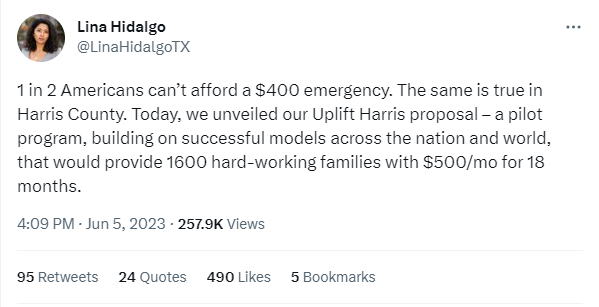Lina Hidalgo's Vision: Anti-Poverty In An Automated Future
Harris County Judge Lina Hidalgo's pilot UBI program will help build a resilient society in a rapidly changing world.
As our world hurtles toward an era defined by the explosion of automation and robotics, there is a growing realization that many people in our society are ill-prepared to face the transformative challenges ahead. The rapid advancement of technology has the potential to revolutionize industries, redefine job markets, and fundamentally alter the way we live and work. Yet, some are either unaware or cannot grasp this impending reality.
Progressive champion Lina Hidalgo announced a pilot Universal Basic Income (UBI) program for 1,600 families in Harris County yesterday.
This will make the second UBI pilot program to launch in Texas. Austin’s UBI pilot program sends monthly checks of $1,000 to 85 needy households at risk of losing their homes to insulate low-income residents from Austin’s increasingly expensive housing market and prevent more people from becoming homeless.
Why are these programs important?
The consequences of poverty in America are substandard housing, homelessness, inadequate nutrition, food insecurity, inadequate child care, lack of access to health care, unsafe neighborhoods, and under-resourced schools.
Poorer children and teens are also at greater risk for adverse outcomes, such as poor academic achievement, school dropout, abuse and neglect, behavioral and socioemotional problems, physical health problems, and developmental delays.
Economists estimate that child poverty costs the U.S. economy an estimated $500 billion a year, reduces productivity and economic output by 1.3 percent of GDP, raises crime, and increases health expenditure.
The importance of programs like the Universal Basic Income (UBI) pilot initiatives in Texas, including the recent announcement by Lina Hidalgo for Harris County, cannot be understated. These programs recognize the urgent need to address the consequences of poverty in America. By implementing UBI programs, we can alleviate the financial strain on struggling households, provide a safety net, and invest in the well-being and future po’ well-being and future potential. These initiatives are essential for creating a more equitable society and mitigating the negative impacts of poverty in America.
Lina Hidalgo sees this, so she’s launching this pilot program. But, with her announcement, a flood of cries from the right about “communism” and “socialism.”
UBI does not require workers or the government to control the means of production (factories, stores, farms, etc.). It is, therefore, by definition, NOT SOCIALISM.
Unlike current social welfare systems, a UBI would not penalize a person from receiving their benefits for working. Current social welfare systems are set up to be there if a person has a job loss, is disabled, or is below the poverty level. If that person worked or received extra income, their benefits would disappear. That wouldn’t happen with UBI; a person could get a new job and still receive the check.
Economist Ioana Marinescu recently conducted a wide-ranging review of the literature on unconditional cash programs. She concluded, “Our fear that people will quit their jobs en masse if provided with cash for free is false and misguided.”
While it might seem radical, the topic of UBI has been studied and researched worldwide for decades. Time and time again, it has been shown to positively affect the economy, poverty, health, and crime rates, with little to no disruption to employment or taxes.
But why does our society need UBI programs?
The United States exhibits more inequality and disparities of wealth between rich and poor than any other major developed nation. In Texas, 20% of children live in food-insecure households. In addition, Texas had an estimated 27,229 experiencing homelessness on any given day.
While using UBI as a tool to combat poverty is a good method, over the next few decades, the need and use of UBI will become more common.
We talk a lot about manufacturing jobs, insourcing, outsourcing, and bringing back manufacturing to America in the political landscape. Yet, manufacturing workers have already been replaced by machines in many industries. One study estimates that about 400,000 jobs were lost to automation in U.S. factories from 1990 to 2007. But the drive to replace humans with machinery is accelerating as companies struggle to avoid workplace infections of COVID-19 and keep operating costs low.
Robots could replace as many as 2 million more workers in manufacturing alone by 2025 and up to 20 million jobs by 2030.
Manufacturing jobs are never coming back.
Automation. Every corporation is trying to figure out how to automate their business.
It isn’t just manufacturing and factory jobs, either. Earlier this year, McDonald’s announced they were testing robots in drive-thru capacities in Chicago. Last week, McDonald’s announced a partnership with IBM. Their testing in Chicago was going well, and now they’re looking to expand on the presence of AI at their fast-food chain.
Hundreds of thousands of oil and gas jobs will be taken over by robots by 2030. Over the last decade, over one-third of oil and gas jobs have been lost. This trend will continue and pick up the pace as robots replace one of every five roughnecks in the coming years.
There are over one million truckers in Texas. FedEx has already deployed a dozen self-driving big rigs in Texas, and fleet operator J.B. Hunt is also testing autonomous 18-wheelers in the Lone Star State. Each year, these self-driving trucks will take truckers’ jobs. It’s estimated that by 2030, up to 70% of trucking jobs will be gone because of autonomous vehicles.
While robots haven’t overtaken America yet, it’s coming, and we need forward-thinking leaders.
Lina Hidalgo is that forward-thinking leader who recognizes the imminent challenges of automation and robotics. Her pilot (UBI) program in Harris County, Texas, is a crucial step toward addressing the consequences of poverty and preparing for a transformative future.
As our world propels toward an automated future, we must adapt our social and economic systems to ensure the well-being and security of all individuals. UBI programs like the one launched by Hidalgo represent a step in the right direction, acknowledging the need to address the consequences of poverty and prepare us for a world to mitigate the challenges posed by automation and robotics. By embracing progressive ideas and proactive measures, we can create a better-equipped society to navigate the transformative challenges ahead and ensure a more equitable future for all.






